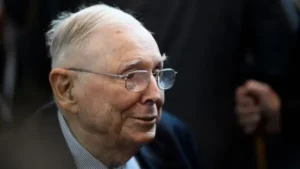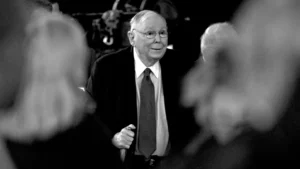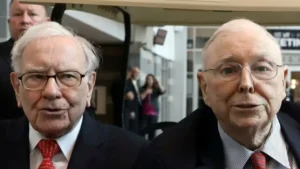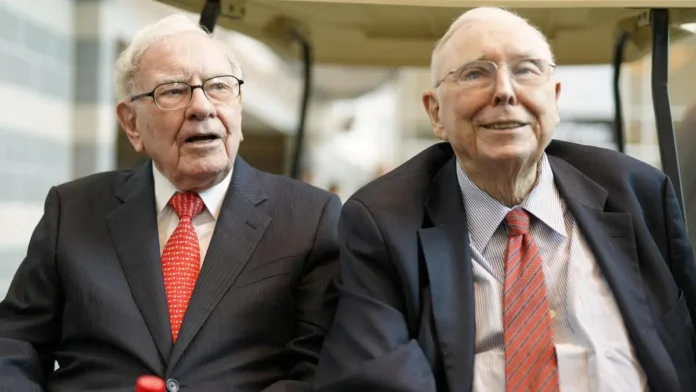Charlie Munger was crucial in helping Buffett diversify his investment approach and concentrate on identifying high-quality, cheaply valued companies, which helped turn Berkshire into an investment powerhouse.
With his passing on Tuesday, November 28, at the age of 99, Charlie Munger, Warren Buffett’s right-hand man at Berkshire Hathaway, brought an end to a significant period in both corporate America and investing. The conglomerate released a statement stating that he passed away at a hospital in his home state of California.
Munger was crucial in helping Buffett diversify his investment approach and concentrate on identifying high-quality, cheaply valued companies, which helped Berkshire become a financial powerhouse.
In a statement, the 93-year-old chairman and CEO Buffett said, “Charlie’s inspiration, wisdom, and participation could not have been built to its present status at Berkshire Hathaway.
Seeking a change, he closed the firm in 1975 and joined Berkshire three years later as vice chairman. Buffett was known to Munger before he joined the company. In the 1960s and 1970s, they invested in the same companies and had similar investment goals.

At Berkshire, Munger started collaborating closely with Buffett on the distribution of the company’s capital. Because of how frequently he rejected investment proposals that he thought were unworthy, he earned the nickname “the abominable no-man.” Furthermore, Munger forced Buffett to stray from “cigar-butt” investments, which were subpar businesses with a little bit of smoke remaining that could be purchased for extremely low prices.
In a 2015 letter to shareholders, Buffett said, “It took Charlie Munger to break my cigar-butt habits and set the course for building a business that could combine huge size with satisfactory profits.” The guideline he provided me with was straightforward: instead of purchasing fair businesses at great prices, consider purchasing wonderful businesses at fair prices.
The ideas turned Berkshire’s fortunes around. Munger, for example, convinced Buffett to approve Berkshire’s $25 million acquisition of See’s Candies in 1972, despite the fact that the California confectioner’s “annual pretax earnings of only about $4 million,” as per a CNBC report. Since then, Berkshire has generated sales of over $2 billion.
Charlie Munger passed away in a California hospital. He assisted Warren Buffett in turning Berkshire Hathaway into a major player in the investment world. His age was 99.
In a statement, Berkshire Hathaway said that Mr. Munger’s family informed the business that he passed away at the hospital on Tuesday morning, a little more than a month shy of turning 100.
Charlie Munger started much lower, despite being known as the “Oracle of Pasadena” due to his skill as an investor. Warren Buffett’s longtime confidante and vice-chairman of Berkshire Hathaway, Munger, used to work for a pitiful $2 a day at his grandfather Ernest’s grocery store.

One of his first jobs was as a clerk at Buffett & Son, an elegant grocery store owned by Ernest in Omaha, where he worked a 12-hour shift and was paid $2. There are numerous accounts of his teenage years in the 1930s spent at the grocery store that make clear that young Charlie Munger did not meet Warren Buffett—who is six and a half years his junior—at that time. While Buffett had also worked there, their paths did not cross until 1959.
On January 1, 1924, Charlie Munger—a child born during the Great Depression—was born to Alfred and Florence Munger. The successful investor, whose estimated net worth at the time of his death was $2.6 billion according to Forbes, had stated that people were less satisfied with the current situation than they were during the harder times, such as the Great Depression.
Munger, a director of the Daily Journal, stated at the publication’s annual meeting last year that “people are less happy about the state of affairs than they were when things were way tougher.
It’s peculiar for an individual my age, as I experienced the extreme hardships of the Great Depression,” Munger remarked, adding that he came of age in the 1930s, as per CNBC.
He had stated in the same meeting that envy is a motivating factor for a lot of people. After everything has improved by roughly 600%, Munger said, “I can’t change the fact that a lot of people are very unhappy and feel very abused because there’s still somebody else who has more.”
Munger stated, “If you wait until the economy is working properly to buy stocks, it’s almost certainly too late,” at the annual meeting of Wesco Financial Corp. in 2009, during the worst recession since the Great Depression.
Munger served in the US Army Air Corps during World War II in addition to being a well-known rags-to-riches tale. After enrolling at the University of Michigan, he left to enlist in the army. Munger never completed his undergraduate studies, but in 1948 he was admitted to Harvard Law School and began practicing law in Los Angeles. He was a co-founder of the legal practice that is now Munger, Tolles & Olson. In the middle of the 1960s, he started investing.
In Omaha in 1959, he met Buffett, who would later become a long-term business partner. They started talking after meeting in a private room at the Omaha Club. Before they were spending hours on end talking on the phone, more exchanges of this kind occurred.
Buffett biographer Alice Schroeder claims that Munger joked, “You don’t understand…,” in response to his wife’s question about why he spends so much time conversing with Buffett. That person is not your typical human.







